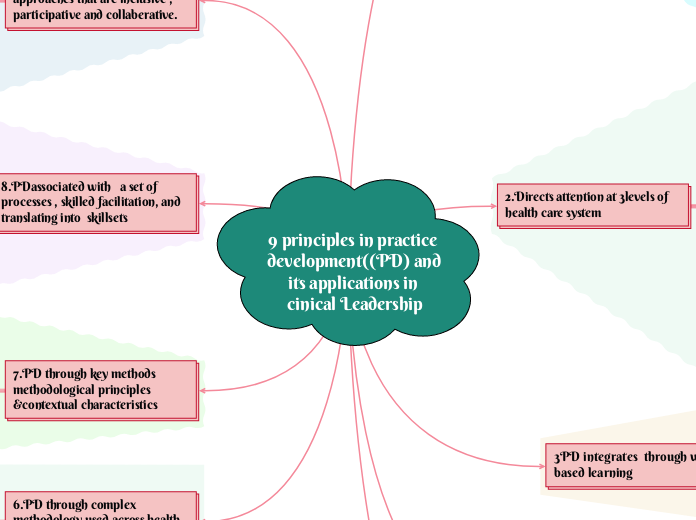9 principles in practice development((PD) and its applications in cinical Leadership
1.Aims to Achieve Person-centered and evidenced based care
Human Flourishing
overall well being-physical, emotional, spiritual and social well being
individual needs ,respect for right and dignity
fulfillment
Workplace Culture
Staff empowerment
research findings, best practices,
supportive leadership
communication Channels
innovative and creative ideas
collaboration,professional development
positive reinforcement
2.Directs attention at 3levels of health care system
Microsystems level(Individual level)
Macro system Level(Organization/System )
Policy making, Quality Improvement
Leadership and management, Resource allocation
Mezzo Ststem Level (Community/intermediatory)
Community engagement , teamwork,
Stakeholder involvement ,national health care policies , legislation
3PD integrates through work based learning
Active Learning
case study, simulations , role play, competencies ,participation , problem solving
Formal learning
workshop , seminars , performance evaluation
4.PD through development of evidences from practice &use of evidence in practice
Gathering information and applying clinically
Research methodology, epistemology , ontology
9.IntegratesEvaluation approaches that are inclusive , participative and collaberative.
includes stakeholders engagement (patient, family,health care professionals, community members )in evaluation process
Participatory evaluation methods - survey, interviews .
collaborative Evaluation- enables stakeholders to participate in evaluation activities and apply findings to practice
8.PDassociated with a set of processes , skilled facilitation, and translating into skillsets
Strategic planning ,quality improvement projects, Root cause analysis, Sharing of learned lessons to prevent reoccurrences, daily patient rounds , patient safety assurance , make needed changes
Skilled facilitation through conflict management ,unit meetings, active discussions among team members , collaboration of multidisciplinary teams , effective communication
7.PD through key methods methodological principles &contextual characteristics
flexibility of methods as per needs , research methodologies , promote continious learning and encouragement , decision making ,training to staff,workshop,, new guidelines
cultural , organizational , social contexts ,consider the needs of patient resources
6.PD through complex methodology used across health care teams
Internal stakeholders(health care professionals, administrators )
external stake holders( patients and families , community organizations )
5.PD through creativity
Through cognition , provides different energies, novel concepts
free thinking, human flourishing
